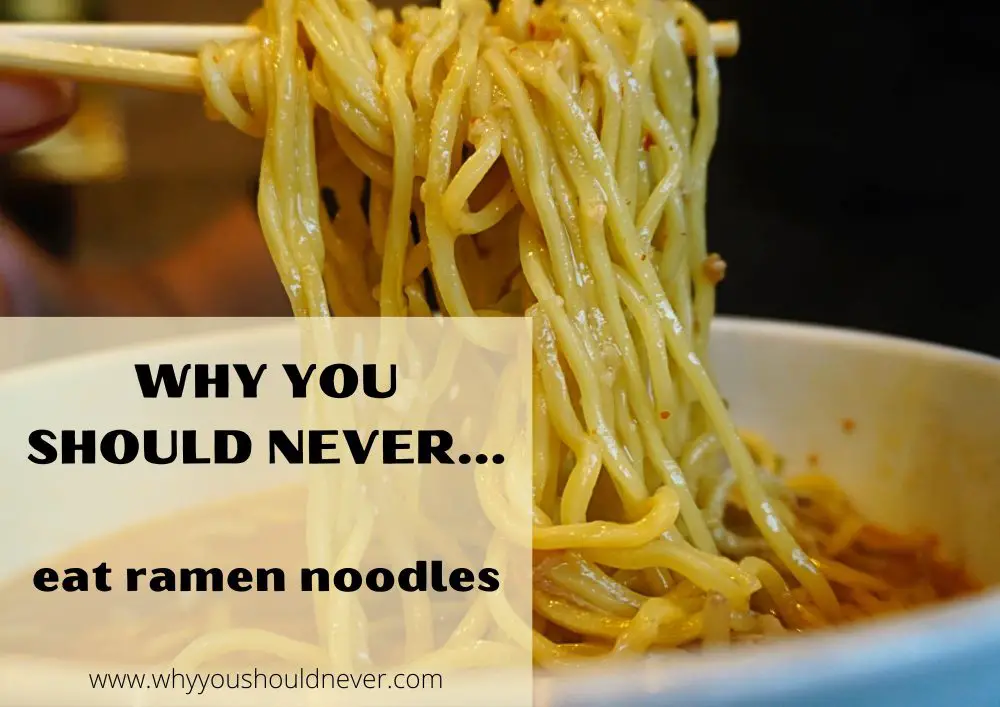![]()
Why You Should Never Eat Ramen Noodles
Ramen noodles are a type of fried noodle that originated in China. They became popular in Japan during the Meiji period, and after World War II they began to be sold in the United States.
Ramen noodles are made from wheat flour, water, salt, and some kind of alkaline agents such as potassium carbonate or sodium carbonate. The noodles are then fried in oil and often served in a broth with various toppings such as vegetables, meat, or eggs.
They’re cheap to buy and quick and easy to prepare, which is why they’ve become so popular, especially among college students and other people on a budget.
But despite their popularity, there are many good reasons why you should avoid eating them, which we’ll discuss below.
8 reasons why you shouldn’t eat ramen noodles
1. They’re high in calories and fat
A single package of ramen noodles contains about 400 calories when prepared, and most of those come from the noodles themselves. The broth is also high in fat, and the toppings can add even more calories and fat to the dish.
2. They’re high in sodium
Ramen noodles are also very high in sodium, i.e., very salty, with a single package containing nearly 2,000 mg of sodium. That’s more than three-quarters of the recommended daily limit for sodium, and it’s even higher if you include broth and toppings.
3. They’re low in nutrition
You’re not going to get much in the way of nutrition from eating ramen noodles. They’re mostly just empty calories with very little protein, fiber, or vitamins and minerals.
4. They may contain harmful chemicals
With processed food like noodles, preservatives are added to them so that they have a longer shelf life. Some of these preservatives, such as TBHQ (Tertiary-Butyl hydroquinone) and BHA (Butylated hydroxyanisole), have been linked to cancer and other health problems.
5. They don’t really fill you up
Ramen noodles may be filling in the sense that you’re no longer hungry after eating them, but they don’t provide lasting energy or satisfaction. You’ll likely find yourself getting hungry again not long after eating them, which will lead you to overeat or make poor food choices later on.
6. They can be addictive
Yes, ramen noodles can be addictive. The combination of salt, fat, and carbs makes them hard to resist, and eating them can lead to cravings for more.
Typically, food manufacturing companies use certain flavor enhancers, such as MSG (monosodium glutamate), to make their products more addictive. In addition to making you addicted to junk food, MSG has been linked to headaches and nausea, among other horrible things.
7. You’ll feel bloated and sluggish
Ramen noodles are a common cause of bloating, especially if you’re already sensitive to gluten or have a sensitive stomach. This is because the noodles are made with wheat flour and contain gluten, which can be difficult to digest.
You’ll also feel pretty sluggish and lethargic after eating a big bowl of ramen noodles, due to the high carb and fat content.
8. They’re not good for the environment
Ramen noodles are often packaged in plastic, which is not biodegradable and takes centuries to decompose. Plastic pollution is a major environmental problem, and it’s something we should all be concerned about.
Conclusion
We probably can’t tempt you away from this quick, delicious treat entirely, but we hope we’ve at least given you some reasons to think twice before reaching for the instant ramen the next time you’re feeling hungry.
Keep these things in mind, and try to limit your intake of ramen noodles as much as possible. Everything in moderation, as they say.
